MercoPress. South Atlantic News Agency
Politics
-
Monday, July 2nd 2012 - 05:13 UTC
Gibraltar and Spain agree on new round of fishing activities technical talks

Gibraltar and Spain are edging closer to a fishing activities agreement and a further round of technical talks between the Gibraltar Government’s fishing commission and Spanish fishermen has been agreed for next week.
-
Monday, July 2nd 2012 - 01:00 UTC
“Argentina will be responsible for the end of Mercosur” claims top Brazilian businessman
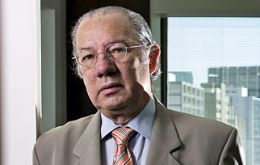
Brazilian businessman Rubens Barbosa, head of the foreign trade council of the Sao Paolo Federation of businessmen said on Sunday that in the last six months, the Argentine presidency of the bloc implemented measures that practically killed the Mercosur.
“Argentina will be responsible for the end of Mercosur,” he predicted. -
Monday, July 2nd 2012 - 00:50 UTC
Venezuelan presidential campaign takes off: Chavez leads massive rally

President Hugo Chávez shook off his health problems to lead a massive rally on Sunday while opposition rival Henrique Capriles took to remote regions for the formal launch of Venezuela's presidential race.
-
Monday, July 2nd 2012 - 00:23 UTC
Former Mercosur top official blasts lack of political support and coordination
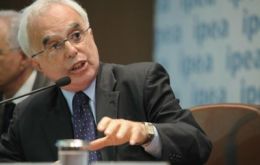
Mercosur high representative Samuel Pinheiro Guimaraes resigned because of “political reasons”, following the presentation of a report warning on the future of the regional block in the framework of the international crisis.
-
Monday, July 2nd 2012 - 00:16 UTC
Paraguay considers consulting the people whether “to continue or not in Mercosur”
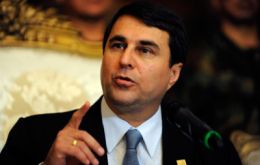
Paraguay’s government blasted Mercosur decision of incorporating Venezuela as a full member of the bloc “before finishing the legislative procedure to do so” and did not discard the possibility of having the Paraguayan people “decide whether to remain or not in Mercosur”.
-
Saturday, June 30th 2012 - 05:39 UTC
Mercosur doubles list of goods that can have tariffs raised unilaterally 35% by each member

Mercosur rejected an Argentine proposal to raise imports tariffs on all goods from outer zone to protect local industries, but accepted Brazil’s initiative to raise tariffs unilaterally on 200 goods, up from 100 agreed last December.
-
Saturday, June 30th 2012 - 05:25 UTC
Relief in EU: German parliament approved Euro rescue fund and fiscal pact

As expected, more than two-thirds of the lawmakers in Germany's parliament moved on Friday to approve the permanent Euro rescue fund, the European Stability Mechanism, and a fiscal pact long championed by Chancellor Angela Merkel.
-
Saturday, June 30th 2012 - 05:12 UTC
Wikileaks Assange “declines to comply” police order and remains at Ecuadorean embassy

Wikileaks founder Julian Assange is ignoring a London Metropolitan Police order to surrender himself at a police station, his representative has said. Susan Benn said he was advised to “decline to comply” and will remain inside the Ecuadorian embassy while his application for asylum is processed.
-
Saturday, June 30th 2012 - 05:05 UTC
Mercosur agrees info exchange on hydrocarbons naval traffic to the Falklands
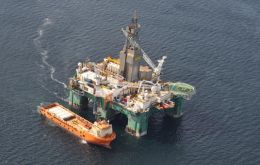
Mercosur agreed at the Mendoza summit to exchange information on ships and other “naval artefacts” involved in hydrocarbons activities with routes that include the Falklands/Malvinas Islands over which Argentina claims sovereignty.
-
Saturday, June 30th 2012 - 04:45 UTC
Unasur suspends Paraguay; names Peru at the group’s pro-tempore presidency
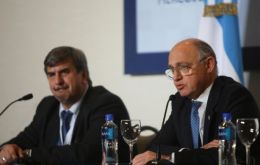
Unasur, Union of South American nations on Friday suspended Paraguay from the group following the ouster of the country's former president, Fernando Lugo. The decision was adopted at an extraordinary meeting in Mendoza, Argentina where earlier in the day Mercosur members adopted a similar measure.
